Changing context
How much has changed since LSE was founded in 1895, moved to the current site in the early 1900s, and the Old Building opening in 1922! And the recent transformations in how we learn, research, work and play, in growth of student numbers – by over 28% from 2010-11 to 2023-24, and enrichment from the School's global community – almost 65% of the 12,000+ students are now from beyond the UK, bringing wider experiences of campus life and university infrastructure to LSE.
How has the School addressed the complex challenge of evolving the campus to meet students’ wants and needs, especially given the compact campus and central location that students value?
Alongside marked social change, the last two decades have also brought extensive alterations to the physical campus. Current LSE students tend not to know how far-reaching this has been.
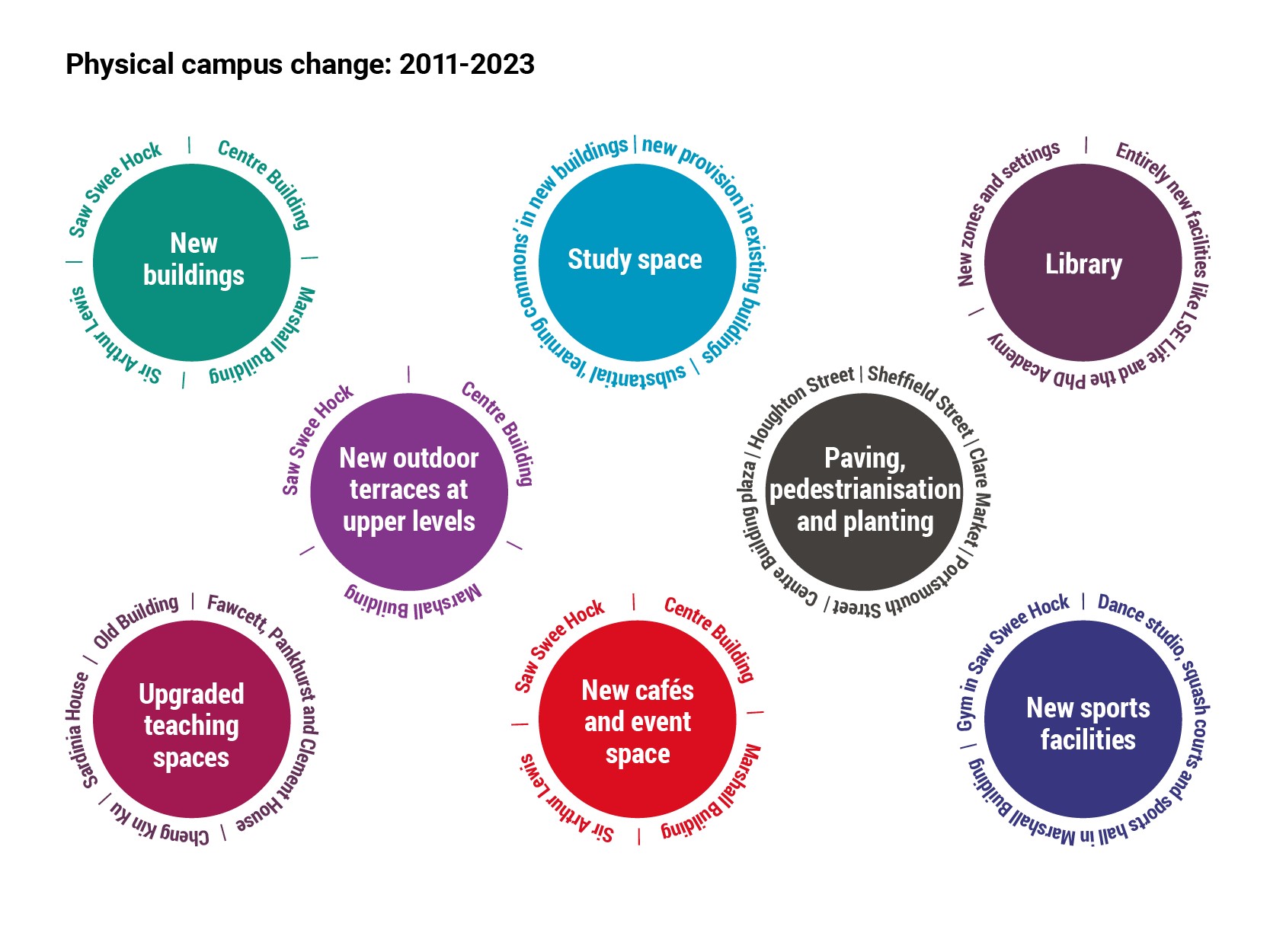 Physical campus change: 2011-2023
Physical campus change: 2011-2023
Evidence-led approach: serial research of student perceptions
The approach has been evidence-led. In 2011, the current Director of Estates commissioned research to learn how students perceived the campus. Structured interviews with 100 students established a baseline picture of student experience, and a steer to help guide campus development. A notable student issue in 2011 was lack of study space, so in 2012 LSE commissioned research on what students wanted new campus study space to offer. Then, in 2015, 2019, and again in 2023, LSE commissioned follow up research on students’ experience of the campus overall. As a series, these results provide an instructive longitudinal perspective. There is no known equivalent for another university.
The serial data shows the positive impact of these enhancements on student experience. In all four studies, students’ top favourite thing about the campus is its compactness.
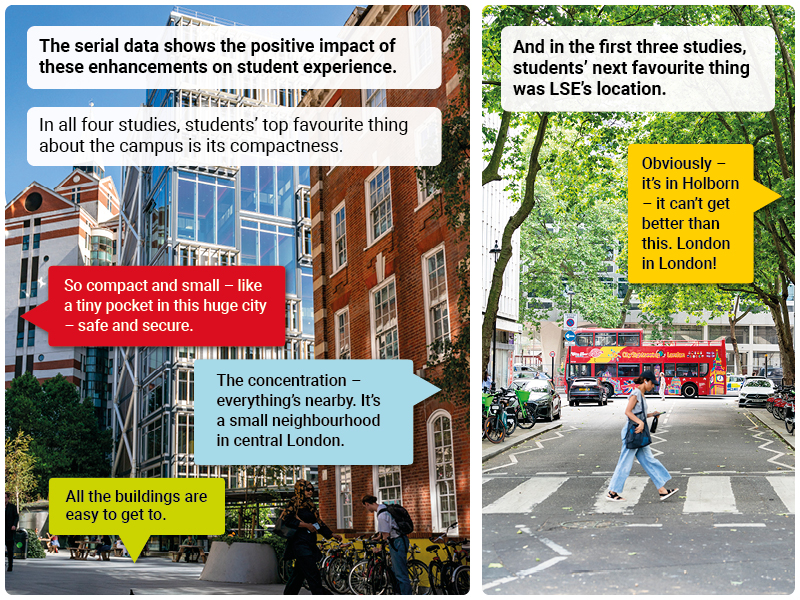 Students' favourite things: serial data
Students' favourite things: serial data
But the latest research shows that by 2023 the ambitious programme of campus development was being appreciated – students’ second favourite thing collated as ‘Architecture and design’, with ‘Range and choice of settings’ next. This evidences the step change in students’ assessment of campus provisions as intrinsically effective, now exceeding the appeal of LSE’s valued location.
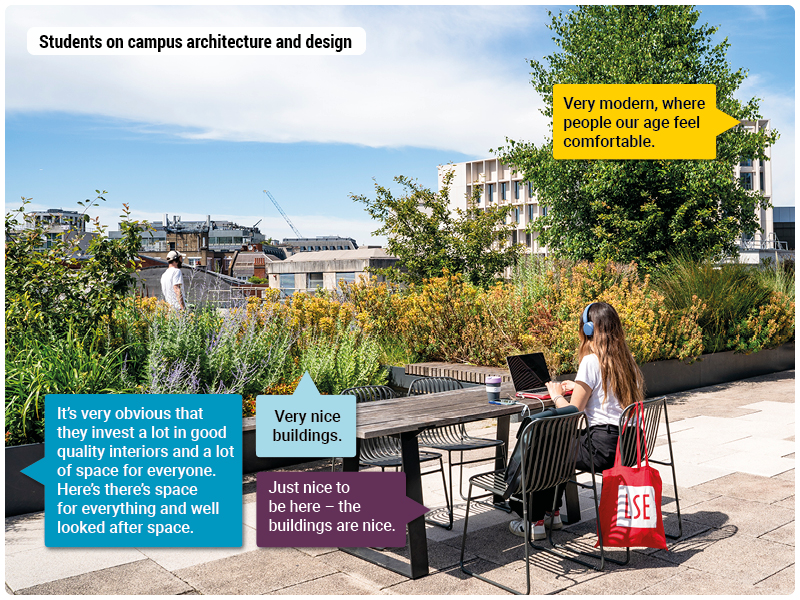 Students on the campus architecture and design
Students on the campus architecture and design
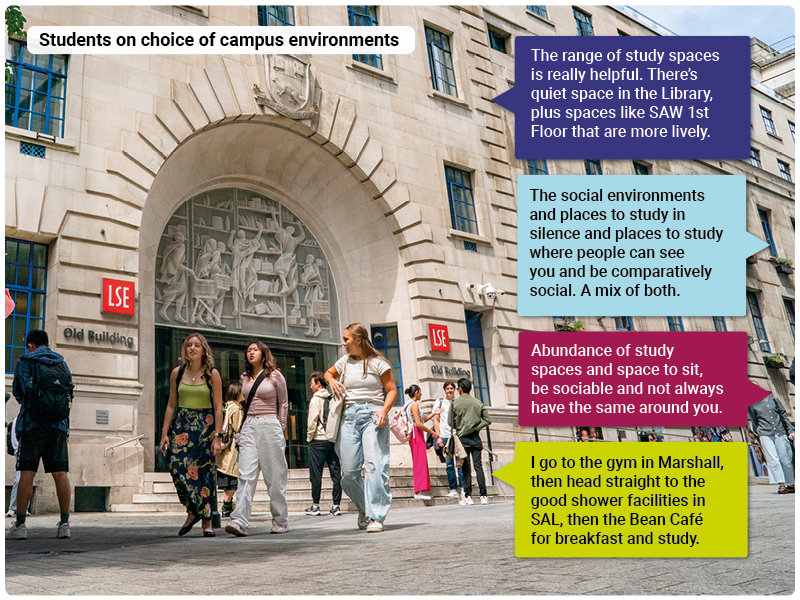 Students on choice of campus environments
Students on choice of campus environments
As well as in their words, students’ appreciation of the campus improvements shows in their changed ratings. When questions on high level effects of campus quality were introduced in 2015, just one aspect emerged as a Major Success. Following a more positive swing in 2019, the 2023 result was dramatic, with all but one of an expanded range of campus effects evaluated as Major Successes. This is more even more notable given LSE’s growing student numbers.
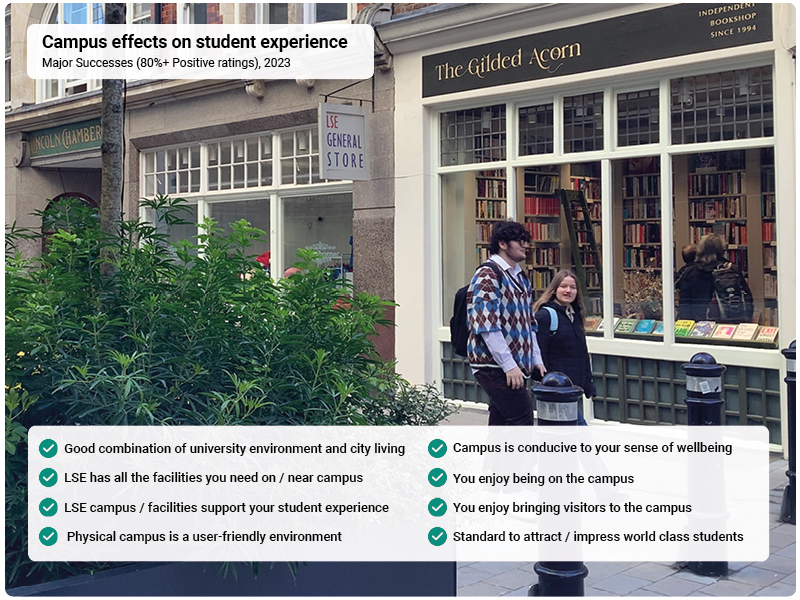 Students on choice of campus environments (image © ZZA)
Students on choice of campus environments (image © ZZA)
And the remaining campus effect – A stimulating + inspiring place to work, learn + play – was evaluated as a Success (80%+ ratings Positive or OK), but with notably more Positives than OKs compared to 2019.
The new campus buildings play a significant role in this positive trajectory, and since 2011 students’ favourite campus buildings have been the newest ones. In 2019, the then recently opened Centre Building was students’ favourite building by a long way – liked for its daylight, views, and choice of study settings. In 2023 Centre Building maintained this lead, now sharing it with Marshall Building – liked for its architecture, atmosphere, and facilities. But the data shows it’s not just ‘newness’ that counts; it’s also quality. CKK first opened in 2008, and liked for its look, feel, and ethos, it remains prominent in citations of students’ favourite buildings. And the choice that’s now available between buildings of different character is another positive.
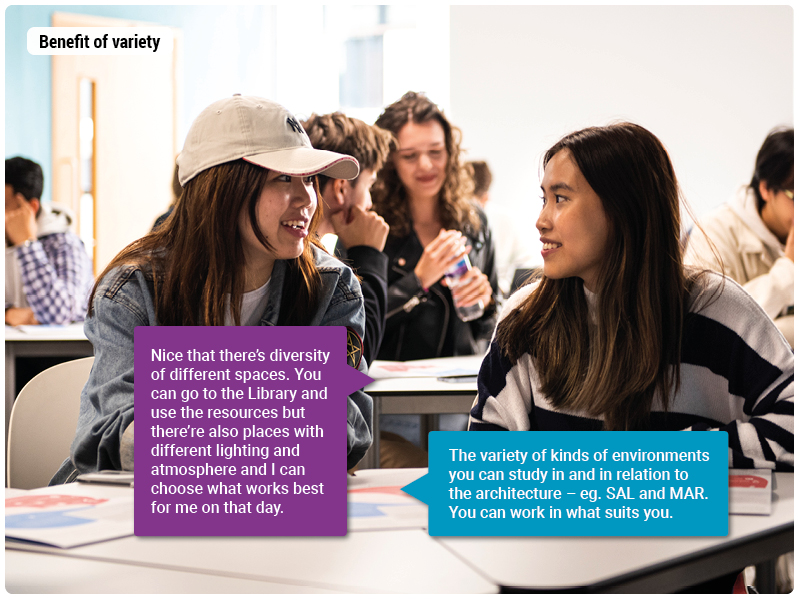 Benefit of variety
Benefit of variety
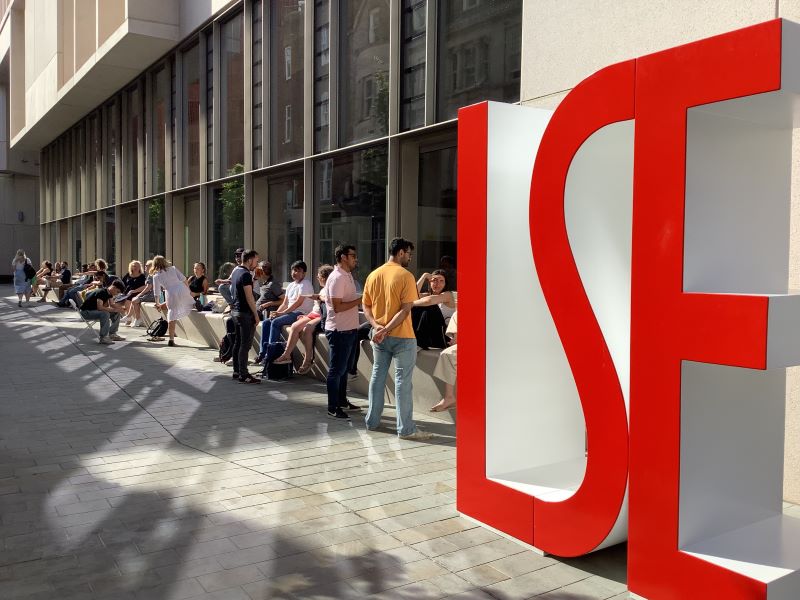 Students relaxing on pedestrianised Portsmouth Street (image © ZZA)
Students relaxing on pedestrianised Portsmouth Street (image © ZZA)
Having good infrastructure is fundamental to campus quality, but how it’s managed is also crucial to users’ experience, and the research shows notably progressive stewardship. In 2011, students’ worst thing about the campus collated as ‘Standards: design, condition, maintenance, and cleanliness’. The two subsequent studies showed incremental improvement.
Then in 2023, students’ evaluation all aspects of campus management as Major Successes reflected the comprehensive strides in campus care that make a difference to users – cleaning, maintenance, opening hours, security, waste, environmental practice, and containing the impact of construction work.
Inevitably, LSE’s newer buildings lack the limitations of older campus infrastructure, but all the School's buildings are vital to effective operation, and Estates look to even out quality. This includes a key programme to enhance teaching rooms in older buildings that has been positively evaluated, together with the refurbishment of our older buildings to provide student common spaces, such as the recently completed areas for Departments of Anthropology, Social Policy and Sociology.
The main Library has featured strongly throughout. While the 2011 data showed student frustration with its busyness and facilities, considerable refit work since has added capacity and delivered other improvements. This is reflected in the data for 2019 and 2023 which shows the Library’s continuing appeal, despite the wider choice of study setting now available in LSE’s new buildings.
The campus and student expectations
Most students report campus quality as very important to their experience at, and feelings about, LSE, and in 2023, 96% said the design and quality of the campus exceeds or matches their expectations.
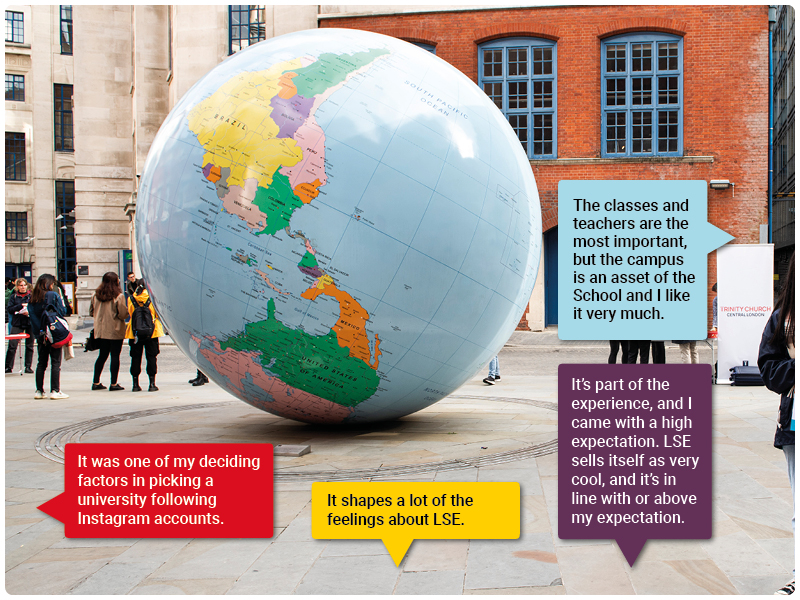 Campus and student expectations
Campus and student expectations
Maintaining the positive trajectory: what next?
The level of student satisfaction with the campus is an important endorsement of LSE’s Estates programme since 2011. The 2023 research provided further affirmative feedback on how the campus is being developed and run – students’ most cited ‘Worst thing about the campus’ was ‘Nothing’!
But these positive results aren’t an end point. As well as tracking the impact of change to date, the research focuses on what more students want. And with the basics of campus infrastructure now so much more in line with expectations, students would like more ‘cushion’ – more greening, more sheltered outdoor provision, more scope to relax. This steer has formed part of students’ message since 2011, and considerable provision has already been made by way of pedestrianisation, planting, and new outdoor terraces, but Estates recognise the great importance of student wellbeing on campus, and will be providing more.
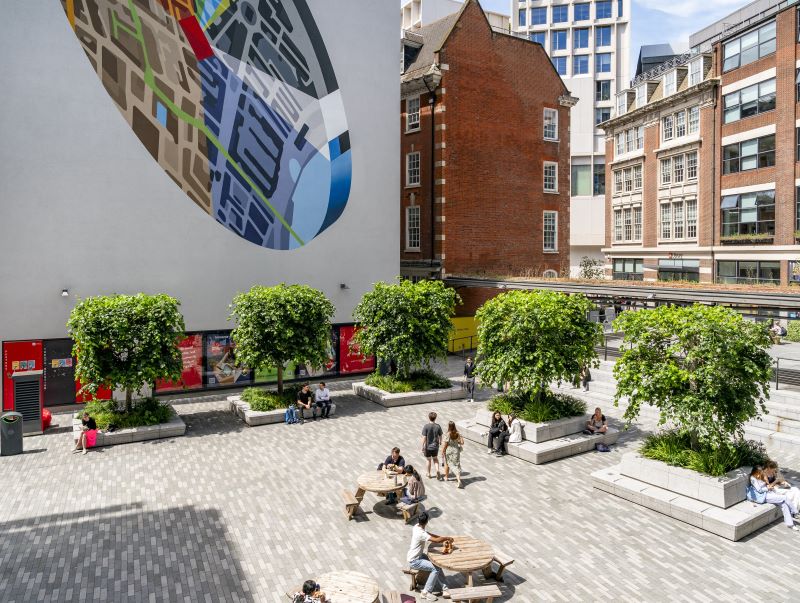 A public square at the heart of the campus
A public square at the heart of the campus
About this report
The respective studies on student perceptions of campus quality in 2011, 2015, 2019 and 2023, and the 2012 research on what student aspirations for campus study space, were undertaken by ZZA Responsive User Environments, specialist researchers focusing on user experience of buildings and spaces. ZZA also authored this report on the longitudinal trajectory.